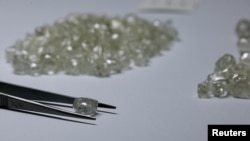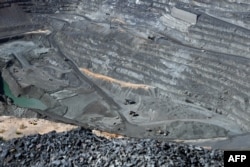De Beers has relocated its auctions headquarters from Singapore to Botswana, while the secretariat of the Kimberley Process, a trade regime that certifies rough diamond exports to eliminate trade in conflict gems, also moved to the African nation.
De Beers, which has a long-standing sales agreement with Botswana, sells 10 percent of its diamonds through auctions.
De Beers’ Executive Vice President Paul Rowley said the relocation of its auctions office is part of an effort to streamline its business operations and facilitate the further development of Botswana’s diamond sector.
"The auction platform coming across, it will bring some additional customers and also auction sales will also enable us sell to small players and perhaps some Botswana nationals will be able to register and engage in that platform. That will be very exciting from that perspective,” he said.
The relocation comes as the diamond industry reels from effects of a traceability initiative introduced by the Group of Seven leading industrialized countries, or G7, in a bid to sanction Russian diamonds.
Under the arrangement, all diamonds entering G7 markets are routed through Antwerp, Belgium, to ascertain their origin.
The tracking system, however, has caused disruptions to the supply chain, according to Rowley.
“Obviously there have been the G7 issues in the past few months. We continue to work closely with the G7 and try to find a solution that works for the industry as well as for the G7. We obviously all support [Russian] sanctions; it’s absolutely understandable. What we are concerned about are the unintended consequences of perhaps having a single node, which we think is very inappropriate,” he said.
The relocation of De Beers’ auctions office coincides with the Kimberley Process secretariat commencing its operations in Botswana.
The Kimberley Process is a global initiative by the diamond industry to eliminate trade in conflict gems.
In mid-May, the Kimberley Process will hold its intersessional meeting in Dubai, where the G7’s tracking system is expected to come under intense debate.
The G7 countries and Russia are all members of the Kimberley Process.
World Diamond Council President Feriel Zerouki told VOA that the G7 traceability scheme needs to be reviewed.
“The WDC believes that mechanisms for assuring a diamond’s provenance should be efficient, effective and equitable. However, we don’t believe that the approach of a single Antwerp entry point meets this test. Antwerp is not the source of any diamonds, so it's basically not the best place to certify where a diamond has originated from,” she said.
Botswana’s minister of minerals, Lefoko Moagi, meanwhile, hailed the establishment of the Kimberley Process secretariat in Gaborone.
“The Kimberley Process is an international and multi-stakeholder organization whereby we aim to increase ethical conduct in diamond trade and to prevent conflict diamonds from entering legitimate trade in rough diamonds. Therefore, this is very key for us; we will protect our diamonds with everything that we have,” said Moagi.
Botswana is the world’s second-largest producer of diamonds after Russia and is leading calls for the G7 traceability initiative to be revised.












